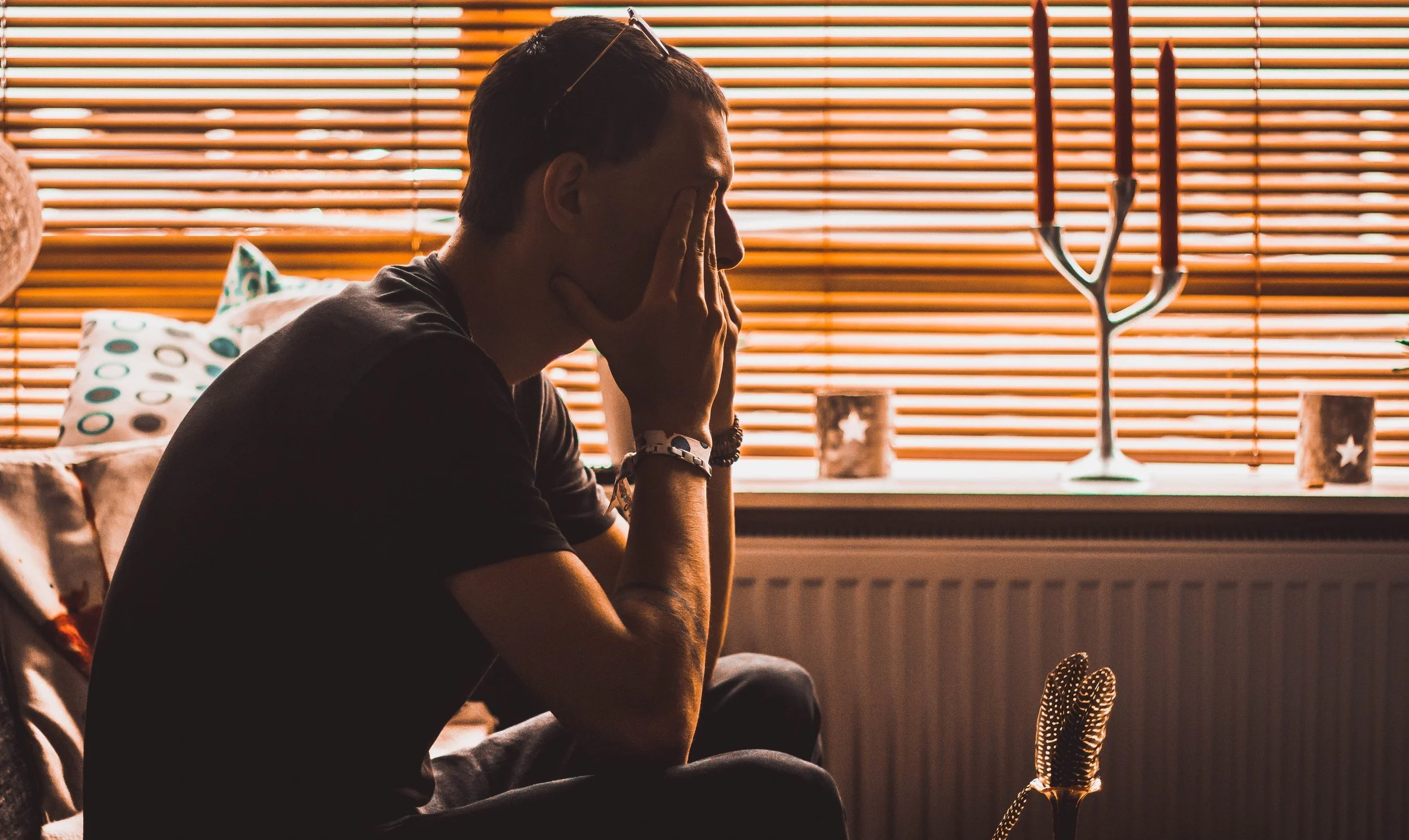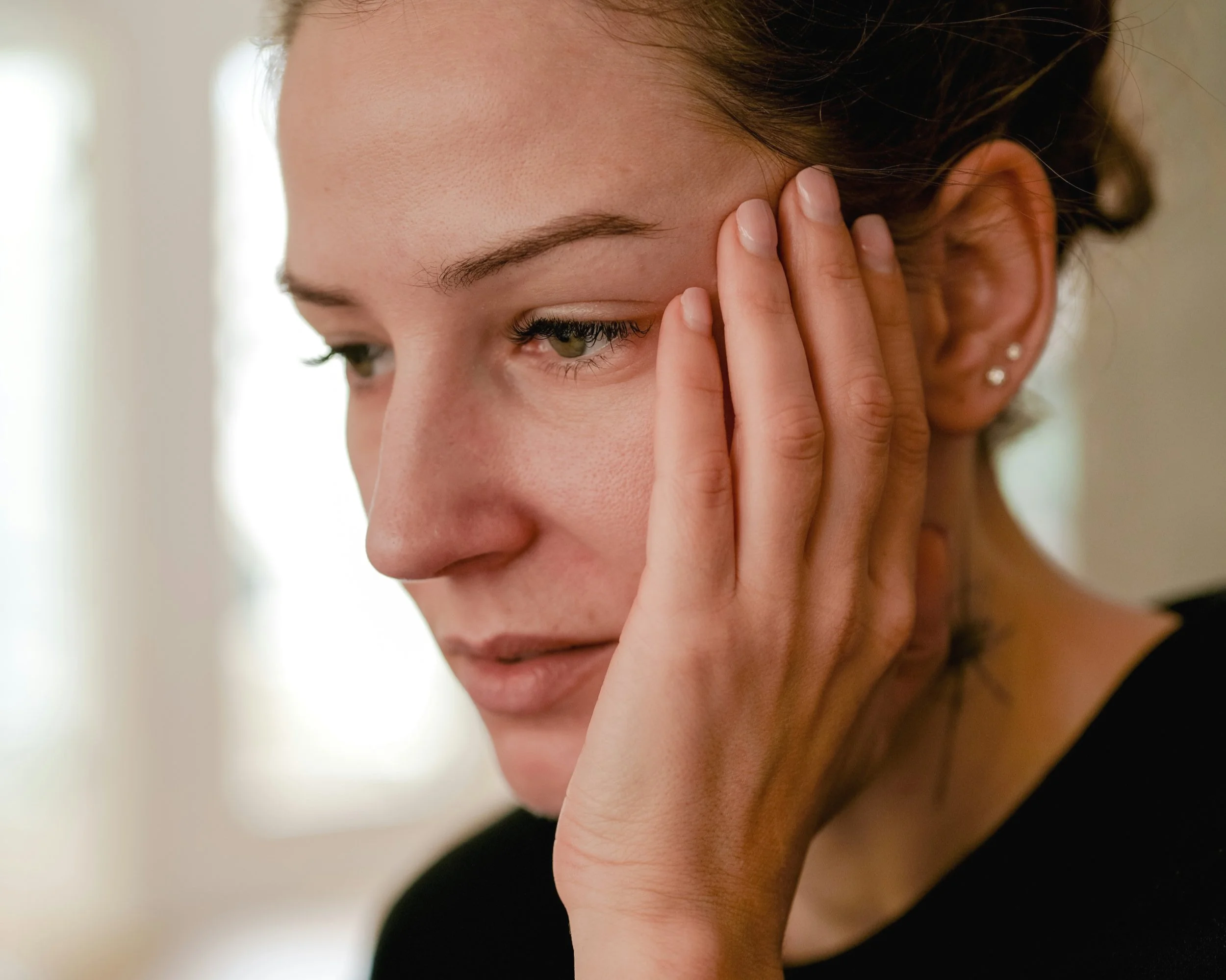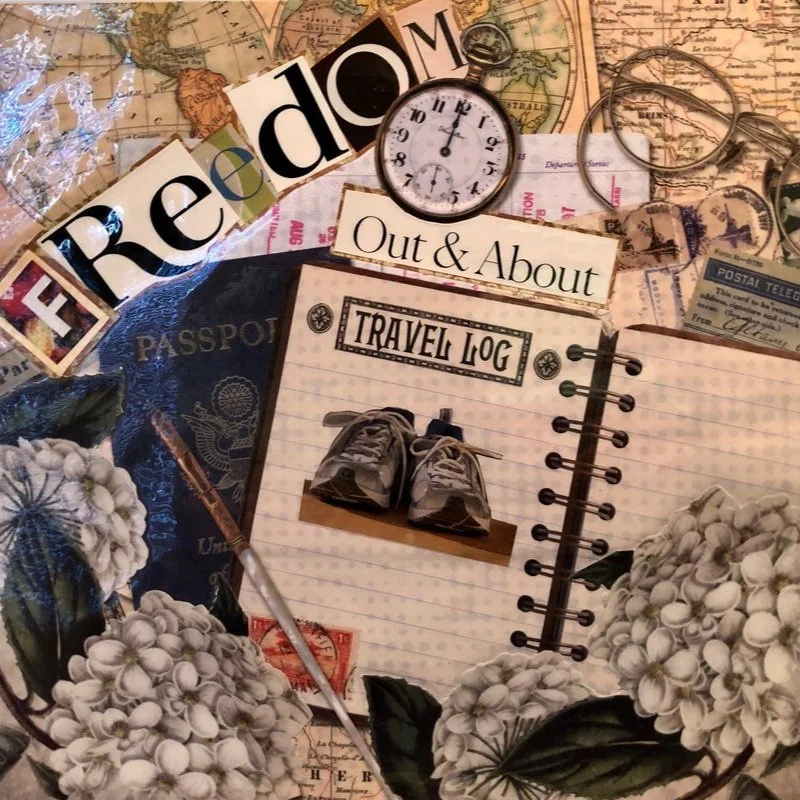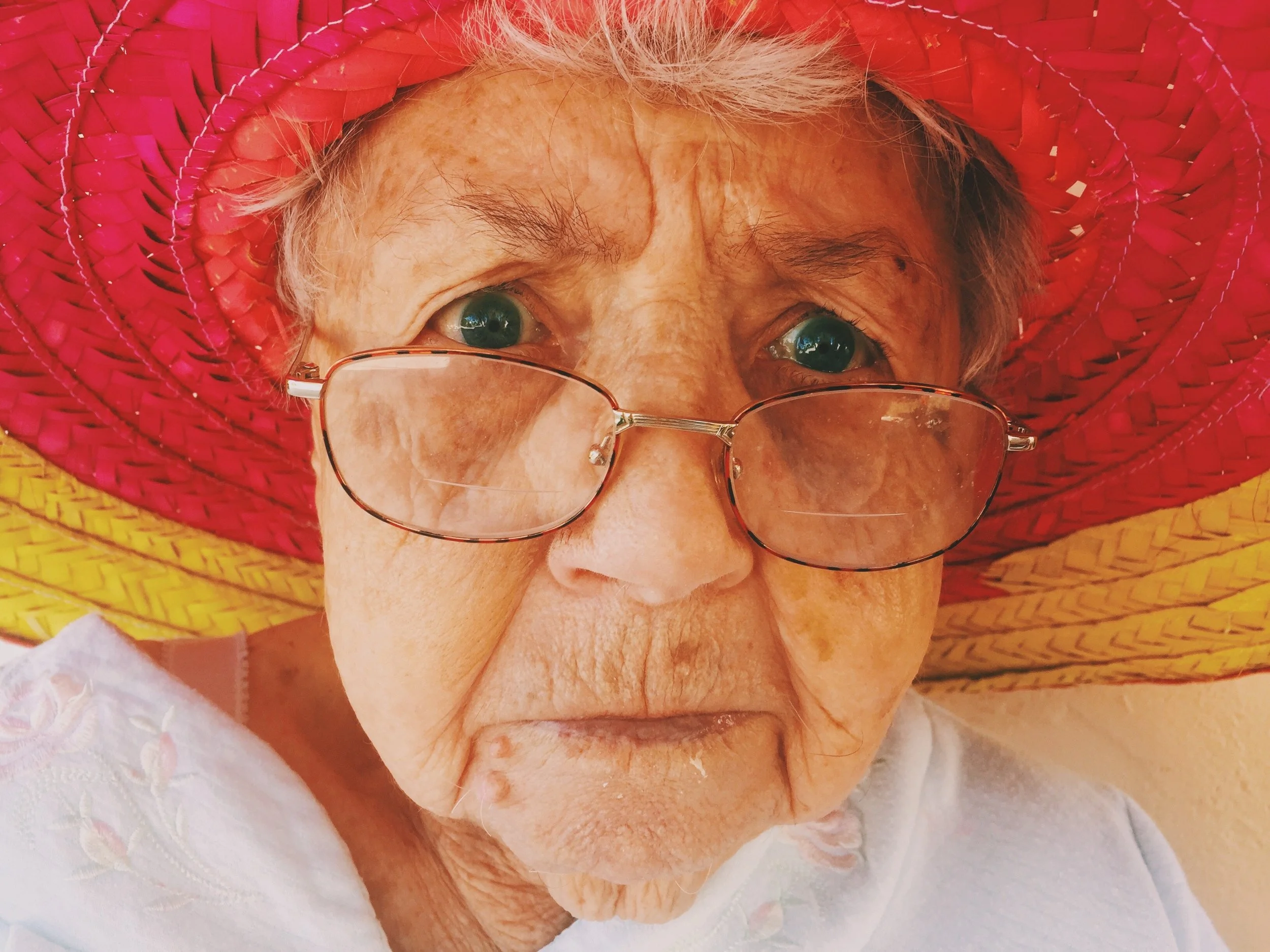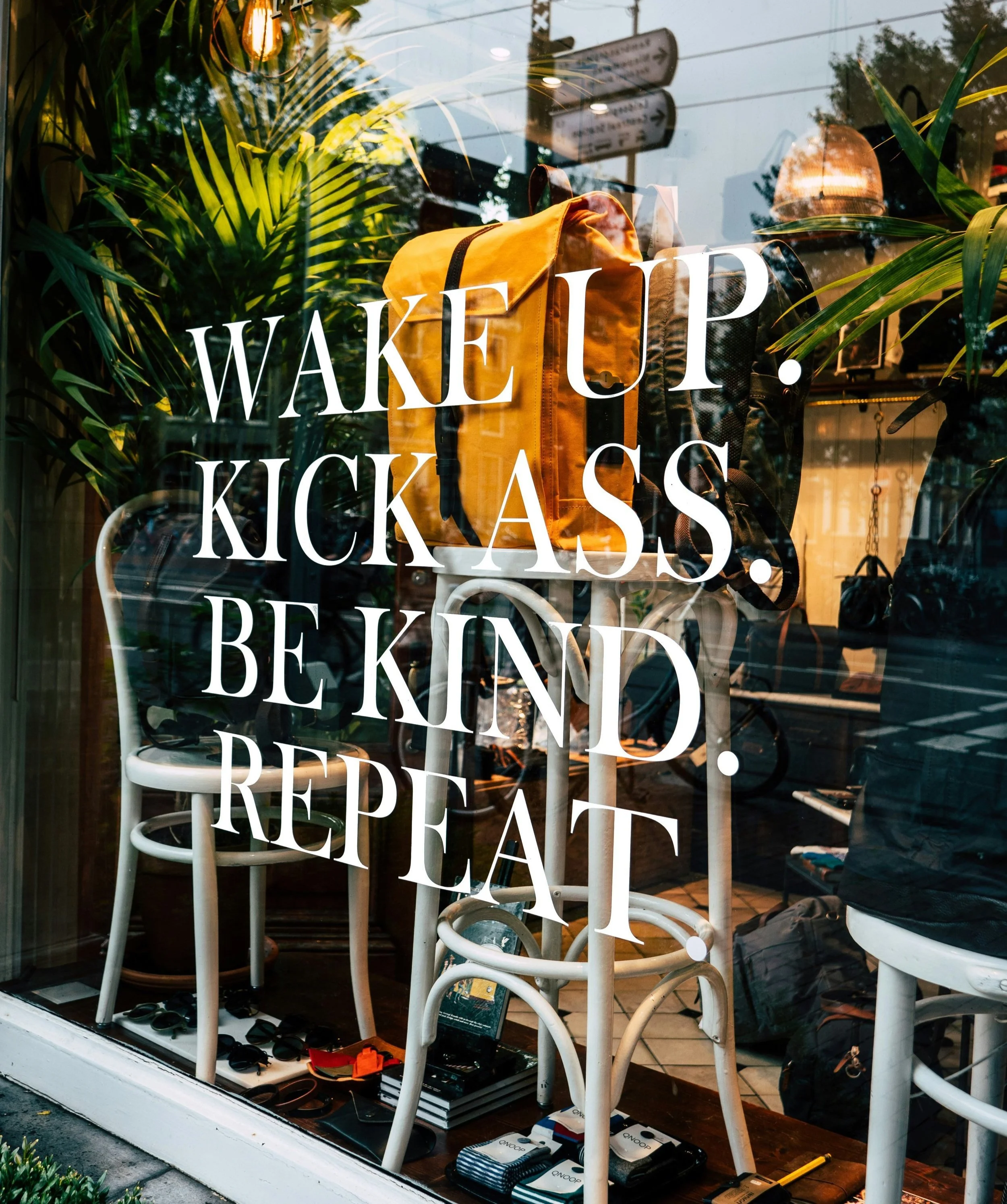
The Blog—Real-life riffs on anxiety, resilience, and being fully present
Looking for the blog? You found it—let’s dig in
I’m Victoria Wallace Schlicht—California-licensed Marriage & Family Therapist and certified Somatic Experiencing® Practitioner—something like a nervous-system whisperer minus the white cowboy hat..
I help anxious, high-functioning adults ditch the “I’m broken” story and find steadier ground. Let’s be honest, nearly everyone you know has either experienced high anxiety or brushed up against it—and how could we not? We’re living in a world that’s spinning faster than we were built to handle. Over-functioning is wearing us out.
We need better tools and a fresh perspective. Good news: I’ve got a stack of both, and I love to share them.
Welcome to my bully pulpit. Each post unpacks the science, stories, and somatic hacks that tame anxious spirals, increase self-regulation, and build real resilience.
Ready for deeper work? Get the scoop on my all-online California practice here.
Is Anxiety Sucking the Joy Out of Your Life
Anxiety can hijack your energy and joy. Discover body-oriented somatic tools to calm a racing mind, rebuild confidence and feel good in daily life—right from home in California.
Explore how anxiety hijacks your joy and drains your energy—and what you can do to reclaim calm, connection, and meaning in your daily life.
When anxiety is running your life it’s time to reach out for help
Noah Buscher-unsplash
There are times in our lives when we need extra help. All of us need some help and support at some point. When it seems like anxiety is getting the upper hand, running the show, running you into the ground, intruding on your thoughts, taking you down a rabbit hole, and stealing your peace of mind and happiness, it's past time to get some support. There is real help for anxiety to help reduce your anxious experience.
Anxiety isn’t just a joy stealer—over time it can even lead to depression
Anxiety, even low levels of constant anxiety, can become a lot to deal with over time. Coping with out of control anxiety, a sense of overwhelm, burnout, or a nagging newer lack of motivation isn't just stressful and disheartening. It can lead to low mood and even depression. Most anxious folks are used to solving problems for themselves and others. When we bump into something we can't solve, it's disconcerting. And even a little alarming.
It seems like we should be able to manage anxiety on our own, like everything else. And we do, for a time. But when we can't solve something as seemingly (or deceptively) simple as anxiety, it hits us where we live. Our sense of self takes a hit. Our sense of competency is undermined. Our (false) sense of control is threatened. When exerting control is how we've coped with life and emotions up to now, we can be caught up short when we can't control our own thoughts and responses. Our own moods and irritability. Our reactivity. Depression often follows unabated anxiety. They travel together. For one thing, dealing with our out of control stress and anxiety is exhausting. It requires a tremendous amount of mental energy. It takes an increasingly physical toll, too. Anxiety and stress are expensive to finance, energetically. When we become discouraged or exhausted enough, our mood may start to falter, as well.
Christopher Lemercier
I specialize in working with highly anxious adults. A therapy incorporating depth-oriented, somatic (or body-oriented), trauma-informed, holistic approaches to reducing anxious experience can improve the overall quality of life. A big part of the work I do is supporting anxious folks on their path to reclaiming their lives. I know this gig from the inside out. When our adaptive skills tend towards anxious management of ourselves, our lives, our jobs, our favorite people, we won't always recognize our own anxiety for what it is. It's just the way we are. It's the way life is. It’s what we feel we “have to” do. We don't know another way.
The things that set us up for anxiety—our history, the situations we've gone through, the lives we've led, our current challenges, which somehow seem too big—also set us up to find it hard to allow help and support. Even therapeutic help. It can feel too vulnerable. Threatening. I get it. Relying on others may have never been possible in the past or has led to painful results and disappointment. There is a better way. A less isolated way. A more connected way. A more interdependent and rewarding way to live. We can work together to create that more satisfying way of living and relating.
Online therapy—you can work through your anxiety from home
Bruno-Emmanuelle—unsplash
Online therapy and telehealth. These days, due to COVID, most therapy is taking place online or over the phone. You can do it from the comfort of your own home. You can even manage it at the office, given you have the privacy to do so. Or from your parked car. There's no commute, so it takes less time on your calendar. Us overscheduled, overfunctioning types appreciate that, don't we? Besides, I get to meet a lot of great dogs!
Therapy is now more convenient and accessible for more people than ever. I am finding it a very popular option for my clients. There's something very powerful about accessing therapy from the comfort of your own home, in your nest, with your favorite mug of something warm to drink, and surrounded by your pets. I’ll share something else with you. After 15 years in private practice as a therapist, and now one of those years fully online,
I can report online therapy works. It’s working just as well for my clients as sitting in my office and we don't have to manage masks in order to work together.
There’s room for more happiness in life
Lowering your anxious experience helps you feel closer to those you love. When we bring our anxiety and overwhelm down, we are able to live more connected and relational lives. Why would that be true? Anxiety takes a lot of energy. It takes a lot of our reserves just to manage ourselves and not lose our shit. Anxious thoughts, worry, and rumination take up a lot of head space. They preoccupy us. Our thoughts will take us out of the present moment. We'll end up alone in our head rather than being with the people we are actually interacting with. They feel our absence. Our inattention. Our irritable distracted edge. And we end up feeling isolated. Isolated, unseen, and alone. There are better relationships on the other side of reducing the hold anxiety has on us today.
You can make the time to feel better now
Caroline Hernandez—unsplash
An investment of your time and energy now can change everything. Given some time, exploring the genesis of your experience, relearning the way you talk to yourself, exploring unreasonable self-expectations, bringing negative intrusive thoughts to heel, working through and establishing boundaries, and utilizing time-tested somatic or body-oriented approaches to relaxation, there is help with reducing anxiety and claiming or reclaiming a happier life. Personal work is a journey of sorts. Therapy and talking to a trained helper can smooth your way and provide a map for moving forward, one step at a time.
I help people who feel bad feel better. Let’s talk. Learn about online anxiety therapy in California.
Anxiety Station Break
When stress has you spinning, mindful pauses and everyday creativity—journaling, drumming, daydreaming—can soothe your system and rekindle joy.
Step out of the anxiety spiral. Discover how mindful pauses—and creative expression—can restore presence, soothe your system, and support self-care.
It’s not all about work and striving
It's really not at all about work and striving. It's not all about work and progress, even in regards to personal growth. Especially in regards to personal growth and your healing journey. You're not going to be able to will yourself into the next iteration of your life or yourself. Or push past anxiety in any meaningful and helpful way. Your anxious experience is here as your teacher, in my opinion, and it is a very patient task masker. Anxiety will wait for you to catch on to the changes that need to be made.
When we’re mired in stress, anxiety, and overproducing, we lose track of ourselves
A lot of us anxious folks have forgotten who we are. We've forgotten what gives us pleasure beyond the pleasure of finishing the job or making the next deadline. We've forgotten our old passions, forgotten what gives us joy, lost track of our playfulness, and mistaken productivity for the source of our happiness. Instead, we work. And work. We manage ourselves and others. We worry and problem solve. We create problems to solve. We dive into our To-Do lists with fervor and grab our dopamine hits there.
Creativity and pleasure can be your greatest tools in reducing overwhelming anxiety
Building time for creativity into your day can help you dig out of your anxious rut. Actually doing creative activities such as journaling, doodling, gardening, painting, or cooking can create a lot of ease in the nervous system. Here's the thing, though, that creative moment can also include daydreaming, dancing, mindful attention to beauty and the quality of light around you, singing, humming, and whistling. In fact, drumming is excellent for altering your sense of time and awareness of self.
Bit by bit, life can become more vibrant
Clem Onojeghuo on Unsplash
Allowing your mind to wander creates a sense of spaciousness and ease. Creates a sense of possibility and potentiality. Creates a sense of optimism. It allows the nervous system to settle. Makes room for something other than worry and busyness. Increases our resiliency. Allows the mind to empty and makes room for a renewed sense of energy and vitality. Slipping into the zone while engaged in creativity, creative thought, movement, music, the contemplation of beauty and nature, is a form of mindfulness and brings with it rewards. We can learn to create more space in our lives for ourselves and in so doing, anxiety can start to slip away. In it's place, we find more energy is available with which to explore life more fully. To live. And that is, after all, the point.
I help people who feel bad feel better. Let’s talk. Learn about online anxiety therapy in California.
Why Am I the Only One Who is Anxious
Anxiety can feel incredibly isolating—especially when it seems like everyone else is coping better. This post explores why anxiety makes us feel alone, how nervous system awareness can shift your experience, and what online therapy can offer when you’re stuck in your head.
You’re not the only one. Explore why anxiety can feel so isolating and how nervous system awareness can shift your experience of being “too much.”
Michael Heise—unsplash
Why does anxiety make you feel like the only one struggling?
When you look around your family, friendship circle, and
co-workers, does it seem like you’re the only one stressing out? Do you get the impression everyone else has somehow
got life wired and is managing better than you are right now? Always? Maybe struggling with a little Imposter Syndrome? Although you’re perceived as competent, does it feel like you’re faking it somehow? If they only knew how you felt and who you were on the inside, they’d never trust you with a coffee order, let alone a project at work.
Anxiety feels isolating, but you're not alone
Your anxiety and struggles are much more common than you'd guess. Yeah, just a part of the human condition at times. This I know, having daily worked with and focused on supporting highly anxious adults in my practice for the last fifteen years
I specialize in anxiety reduction. I utilize depth-oriented talk therapy, cultivating self-regulation and resiliency, and incorporating Somatic Experiencing (a gentle body-oriented trauma therapy) for a well-rounded, grounded, holistic approach to feeling better. While sometimes super uncomfortable and even debilitating, feelings of intense anxiety and even panic attack are common. Too common. In fact, these fears are quite prevalent in our surface-oriented-optimism-and-extroversion-is-good-for-business-and-life culture. Even if the only thing we’re selling is ourselves.
BBH Singapore—unsplash
Comparing yourself to others can fuel anxiety
We compare our inside experience to how other people present on the outside. How they want to be seen. Facebook, of course, is a great example of this. If we’re on social media at all, then most of us are curating our image. Editing. We show ourselves as we want to be seen: successful, accomplished, confident, happy, beautiful, or handsome.
It’s not new, of course. Presenting a front is part of real life too. Playing it close to the chest, when it comes to our fears and weaknesses has probably been going on since humankind reared up onto their two legs, if not before. In fact, we could argue this is just good survival strategy. Awesome adaptive behavior. It pays to look big, strong, assertive, experienced, and in control in the natural world. Everything from frogs to mammals have puffed up and played some competent, confident version of the I’M TOO BIG TO TANGLE WITH game. Or too fast to catch. Or too wily for you. We’re really not that different.
How anxiety and overthinking can keep you from enjoying life
Nik Shuliahin—unsplash
There’s a price to be paid, of course. All this subterfuge. All this hiding out with our insecurities and fears. For one thing, it takes a whole lot of energy to try and control our interior world and not let it leak out in some image shattering way. We don’t want to show when we’re sweating it. We really don’t want to let on when we’re panicking. Of feeling shaken. Here’s the thing, though. Your anxious responses are designed to save your ass and keep you out of danger, not run your life. And certainly not to ruin your life.
One cost of high anxiety and stress is feelings of isolation. The question posed at the start, “Why am I the only one?” is a self-isolating lie. When we are so invested in keeping a lid on it, we fail to open up to others. We lose out on the opportunity to connect and to connect most deeply. We miss the opportunity to be seen and known. We miss out on being loved for who we are. Our bogus painful story that we are inadequate or unlovable is sneakily reinforced. To top it off, our anxiety can keep us so caught up in our thoughts that we're not really available to be present and attentive to the people we care about most. We end up alone in our head, second guessing ourselves, and missing out on our share of the goodies.
Online therapy for anxiety and burnout in California
Ravi Patel—unsplash
Experiencing highly anxious states on a daily basis, or being run down by rumination and intrusive negative thoughts, doesn’t have to be the way it is for you. Even if it is more common than you imagine. You don't need to sacrifice your joy, happiness, and well-being. When anxiety and worry are running the show it’s a good time to get some support. You don’t have to try and solve it on your own. As much as it might go against the grain for you, lean in a little. Allow support. At least talk to a friend, or find a therapist like myself to confide in. A trained, neutral helper can be invaluable at times like this.
There are ways to break anxious patterns of experience. To reduce the painful and invasive thoughts. To sort it out a bit. Lower the level of anxiety, and with it, the depression and low mood. Lower the stress hormones running wild in your body. Reduce the physically uncomfortable sensations that accompany highly anxious moments and feed the cycle of negative and self-limiting thoughts. There are tools to learn. Habits to acquire. Some self-compassion to cultivate. Yes, there is life on the other side of overwhelming anxiety. And it is good.
I help people who feel bad feel better. Let’s talk. Learn about online anxiety therapy in California.
Why Somatic Experiencing—Panic Attack
Collage art by Victoria Wallace Schlicht
Learn how Somatic Experiencing can help you understand the purpose of anxiety, reduce panic and overwhelm, and build increased self-regulation and resiliency.
How chronic anxiety & panic attacks hijack your freedom
Out of control anxiety and panic can rob you of your freedom. It can certainly rob you of your joy and spontaneity in life. Drain you. I see it every day. New clients coming in, weighed down by concerns, worn out by worry and rumination. Bearing all the signs of a nervous system under assault.
The experience we have of overwhelming and out of control anxiety fills our mind and our bodies with disturbing symptoms and sensations. We're caught in endless and intense cycles of rumination, racing thoughts, negative and often catastrophic thoughts, sweaty palms, racing heart beat, breathlessness, tight chest, stomach agitation, acid reflux, Irritable Bowel Syndrome, high blood pressure, muscle pain and tightness. It goes on and on and on. High anxiety is extremely uncomfortable and can have a lasting impact on our general physical health.
Panic-attack symptoms: when anxiety mimics a heart attack
If your generally anxious experience has actually progressed to the level of panic attacks, you're sometimes experiencing all these symptoms and more. Panic attacks will be characterized by their sudden onset and an overwhelming sense of dread and doom. In fact, panic attacks are so intense they routinely send folks to the ER with symptoms similar to heart attack. Heart pounding, chest pain or tightness, sweaty palms, trembling, fear. My clients have reported narrowing of the field of vision, feeling as if they are going to pass out, afraid they are actually dying. The level of panic in an actual panic attack is not something you miss. It's obvious and one of the side effects is often embarrassment. Panic is so intense that after your first panic attack your primary anxious fear may be ever feeling that way again. You'll do anything to avoid feeling this again. Anxiety, in general, and panic, in particular, can have to effect of beginning to limit your life in significant ways. You may stop going places that might lead to anxiety. Stop doing things you enjoy. This can be progressive in nature, ultimately limiting your life more and more.
Chronic anxiety drains energy, self-esteem—and relationships
Our high and anxiety and panic impacts our interior life, our mental and emotional functioning, our sense of agency and control in our lives, our self-esteem, our work and social lives, and can deal a hard blow to our most valued and intimate relationships. Our high anxiety demands a lot out of us and can demand a lot from the people around us, as they make efforts to accommodate our growing list of needs, demands, and restrictions, to say nothing of our irritability. Long-term, highly anxious states can have the unhappy consequence of stressing our most important and intimate relationships, adding yet another level of stress to our lives. Anxiety is exhausting and it can become isolating.
Kyle Broad-unsplash
Why your nervous system gets stuck in anxiety in the first place
Our anxious experience is there for a reason. Anxiety is part of your built-in survival mechanisms. Working as it should, anxiety is there to keep you safe, alert you to danger, and fuel your quick responses. We want you alert enough to know when you're safe and when you're not. The problem is, given enough of the right kind of stimulation over the course of a lifetime, somehow anxiety ends up running the deal. We're stuck in anxious overdrive. Stuck in our anxious problem solving mind. We may always feel afraid in some way, not only when there is something to fear. Instead of being appropriately aware and oriented, we are vigilant and feel under near constant threat. All the time. It's exhausting. And emotionally painful.
The hidden survival function behind anxiety
Alex Harvey—unsplash
Believe it or not, while it may feel like your anxious experience is out to get you and your body has become your enemy, anxiety is here to help. Anxiety is doing it's job of looking out for you, keep you safe, and making sure you avoid danger and pain. It doesn't feel that way, though. Anxious experience promotes and shows up as persistent negative thoughts and highly critical self-talk. An out of control, negative, and critical parent. Sometimes I think of anxiety as a well-meaning, nosy grandma, constantly fussing in our ear about how we won't be successful if we don't do this, or that we shouldn't try something new, launch out into the world, trust anyone other than ourselves, or take a chance on a new adventure. "Don't leave without your coat! It's a scary cold world out there!" Our anxious thoughts are running hard ahead of us trying to keep us safe and willing to use any means possible to do so.
You need your anxiety. It isn't going anywhere. But just like dealing with overly critical and intrusive parents and worried. kvetching grandmas, we can learn to set boundaries. We can learn to bring our out of bounds anxiety back into healthy, functional, and useful levels. It's a process. It's a process and there's a learning curve to negotiate.
How Somatic Experiencing eases panic symptoms in the body
Gabby Orcutt—unsplash
Why use body-oriented psychotherapy for anxiety and panic attack? Because it works. As we've discussed, your experience of anxiety is felt strongly in the body. Overwhelmingly so. You are experiencing it in your gut, in the tightness in your chest and throat, in your breathlessness, through your racing heart, in your racing thoughts, and in your sense of overwhelm. Anxious physical symptoms may arise from our thoughts, even our transient thoughts, and anxious thoughts may emerge as a result of sensations in the body. It's an endless loop. When working with highly anxious clients, I am looking for multiple ways to disrupt this loop and to soften the experience of high anxiety over time. We're looking for a way to emerge from this sometimes overwhelming experience of ourselves.
Anxiety is a very physical experience, as well as a mental one. Our habits of anxious coping strategies are located deep in our nervous systems, in our psyche, and in our history, typically arising from brilliant coping strategies we employed as children. Since the experience of high and anxiety and panic occurs over multiple aspects of ourselves, I prefer a multipronged, holistic, and somatically informed approach. It is what I find most effective. In addition to being trained as a Depth and Systems therapist, I have been fully trained, certified in, and daily utilize Somatic Experiencing, a body-oriented trauma and healing modality. Somatic Experiencing works with the nervous system to support the release, resolution, and healing of big and small traumas. It is also priceless for working with and settling highly anxious adult nervous systems.
Learning somatic self-regulation—no special tools required
One thing I love about holistic body-oriented approaches is they require a body and everyone I know already has a body. No need to buy one. No need to continue to feel overwhelmed by your body and mind. No need to feel you are the victim of your anxious experience. You can befriend your body again. You can get back in touch with your innate joy and well-being. You can begin to notice where you feel the best or most neutral within yourself and allow that awareness to spread. You can become more free.
Wouldn't it be nice to learn how to work with both your mind and your body to reduce your anxiety and panic and begin to reclaim your life? Call now and begin to use your body awareness to learn the deep skills of self-regulation, cultivate resiliency, and get your life back and back on track.
I help people who feel bad feel better. Let’s talk. Learn about online therapy in California.
Boundary Issues & Anxiety
Poor boundaries can keep high-achieving adults stuck in anxiety and burnout. Discover how online anxiety reduction therapy helps you set limits and feel lighter.
How Online Therapy Helps High-Functioning Adults Set Healthy Limits
Key takeaway: Anxious overfunctioning often leads to poor boundaries, resentment, and burnout. Learn how anxiety-driven people-pleasing develops—and how clear boundaries can reduce stress, restore balance, and support authentic connection.
pexels-elevate
Healthy boundaries: your best tool for anxiety relief
You've heard about boundaries, right? I mean, we are always talking about boundaries, but I'm not too sure we understand the term fully. Or its power to create better and more fulfilling friendships and relationships. Good boundaries hold the power to improve our lives across the board. Or to herald a better and deeper understanding of ourselves, our own preferences, needs, and dreams. Experience life with more ease and less anxiety.
Why boundaries fuel personal growth
Raphael Mittendorfer-unsplash
Essentially, boundaries are how we train ourselves and others about how to behave. Boundaries allow us to build more satisfying relationships and even to stay in healthier relationships with some of the most difficult people we love. Boundaries create safety and greater satisfaction in our relationships.
Boundaries allow us to feel less chaotic, less stressed, less overburdened, and less alone. Boundaries are how we teach ourselves and others, "This far and no further." It's how we establish our limits and our preferences. Ultimately, boundaries are the Gold Standard in both self-care and in cultivating our self awareness regarding our own behaviors in interactions with others. Good boundaries allow our relationships to be more enjoyable and far less exhausting. Engaging in relationships becomes energetically sustainable again.
Learning to say “No” without guilt
I often teach clients about boundaries, saying, "Good fences make good neighbors." No, we don't want to wall ourselves off from others, but we do want to create healthy expectations and learn a healthy "No" or "That's enough." response when appropriate. We want to understand and have our associates understand the manner in which we want to be spoken to or treated. How much emotional and physical space we require? What is appropriate to request and expect from us in terms of help, support, a listening ear, and tolerance for poor behavior?
Janko Ferlic—unsplash
When childhood coping becomes adult people-pleasing
Often, due to the way we were raised or the experiences we have had in life, we don't know ourselves well enough to know what we need. Or we feel what we need is to make sure everyone around us is happy and everyone around us is pleased by our behavior and responses. We have not only lost track our needs, but our needs consistently take a back seat to the needs of others. It can feel like this is actually the way it is supposed to be. It may feel like it has always been this way.
In truth, for many of us, this has been the way it's been since we were toddlers. Sometimes, our chaotic or painful family systems felt like they required us to feel into the needs of the adults around us and do what we could to meet those needs. It makes sense. It's a safety first issue of survival and the highly intelligent or emotionally intelligent child is going to sense this and act on it. Good thing, too. These anxious coping strategies can serve us well in childhood and bring us through safely to the other side. The thing is those brilliant strategies of childhood do not serve us near as well as adults.
From caring to over-giving: anxiety’s hidden cost
Based on our experiences, over the years we may have morphed into people pleasers. People pleasing always arises from our anxious coping strategies. It helps us feel accepted. And safe. Especially safe. We developed the people pleasing habit to keep ourselves safe. And valued. This results in our not knowing what our needs are, where we end and the next person begins. It's nearly impossible to set healthy boundaries when we don't know our own needs. We may not even know what we prefer or how to make decisions that are self-valuing. As a result we can end up feeling inauthentic, unknown and unseen, and perpetually overextended, exhausted, and resentful. It's not a lot of fun. Sometimes it can mean we're not a lot of fun to be around, either.
Stay in your lane: boundaries for less stress & more energy
Tim Gouw—unsplash
Our unconscious boundaries and lack of boundaries are a huge personal development challenge. For ourselves, we need to understand what's our business and what's not. Just because we care about someone or have an opinion about them, their lives, and what we think they think of us or expect from us, doesn't mean any of that is actually our business. Or our job.
As an individual, your job is to know and understand yourself. Know, understand yourself and what you need in life and how to fulfill those needs in a healthy manner. It's actually not your role--not your healthiest role--to be a caretaker for everyone around you. It's not your job to know what everyone else needs and make sure you make that happen for them. That's their job. That's their personal work and area of personal growth. Get out of the way and let them have at it.
Boundary Work = burnout prevention for busy professionals
When we are trapped in our anxious experience of ourselves, it can feel like we have to act. There is no choice. That is your anxious mind lying to you, right there.
Doing the work of learning how to establish healthy, functional boundaries is a huge stress reliever. Everything in life will feel easier and more fulfilling, particularly your relationships, when you have established and are maintaining good boundaries. Life gets easier.
Better relationships start with better limits
pexels
The truth is, moving through this deep personal work, the hard work of boundaries, most often requires the support and mentoring of a trained helper. Our weak and permeable boundaries are so close to the core of who we perceive ourselves to be that it can be impossible to notice the issue on our own, let alone effectively address it.
When we stop overextending ourselves in our relationships, at home, in our friendships, and in our business relationships, then work and relationships become more satisfying, less exhausting, and less burdensome. Life feels immeasurably lighter—in your heart, in your mind, and in your body. When everyone takes care of themselves, gives and receives support relatively equally, then we are all more satisfied in life. Relationships become more enjoyable and much less stressful over time. We can learn boundaries and learn to be happier.
Online therapy in California: master boundaries from home
Happiness is definitely the learning curve we want to be climbing, isn't it? Fortunately, help is available. You can access online anxiety therapy from anywhere in California. Ready to turn stress into spaciousness?
Book a free 15-minute video consult and learn how online therapy can help you build rock-solid boundaries—no commute required.
I help people who feel bad feel better. Let’s talk. Learn about online anxiety therapy in California.
Why Somatic Experiencing: Anxiety Reduction
Discover how Somatic Experiencing® taps your body’s wisdom to soothe anxiety. Online therapy across California shows you step-by-step self-regulation.
A Body-First Approach to Calming High-Functioning Anxiety Online
Key takeaway: You’re not the only one. Explore why anxiety can feel so isolating and how nervous system awareness can shift your experience of being “too much.”
Victoria Wallace Schlicht-mixed media poster art
What is Somatic Experiencing
Somatic Experiencing® (SE) is a holistic, naturalistic, body-oriented therapy that directly addresses the manner in which your body and nervous system have stored your life experiences, including trauma and other stressors, and held them in the body. All your experiences, positive and negative, are held in your body. At some level, we all already know this.
These unprocessed, often unrecognized experiences fuel your anxiety, panic, sensations, physical and emotional pain, thoughts, beliefs, and behaviors. Based on 45 years of research and clinical application, Somatic Experiencing allows us to therapeutically harness your body as a primary healing agent and start to release and break down these stuck impulses in your nervous system.
Why Body-Oriented Therapy Beats Talk Alone for Anxiety
We can use Somatic Experiencing, your own mindful regard of your body and its sensations, to notice and track what is happening in your body, to allow these experiences to resolve. More importantly, and more powerfully, you can utilize SE to notice what is always already whole and well in your body and in your life. You can notice and champion your own innate well-being and strengthen your resiliency. This. This is the path to healing, wholeness, and a more deeply realized life.
Healthy Anxiety vs. Runaway Anxiety—Know the Difference
Dennis Alvear Perez —unsplash
Why are men and women using body-oriented psychotherapy for anxiety and panic attack? Because it works. If you're anything like the highly anxious adults I see in my practice every day, your experience of anxiety is felt strongly in the body. Overwhelmingly so. Anxiety can be a highly uncomfortable way to exist. You experience it in your gut, in the tightness in your chest and throat, breathlessness, through your racing heart, in your racing thoughts, and in the type and quality of thinking that is stealing your balance and happiness, and in your sense of debilitating overwhelm. At its worst, you may find it hard to even function and perform your daily tasks. High anxiety has the potential to steal your joy in the present moment, rob you of comfort and connection, disrupt your primary relationships.
When Anxiety Runs the Show, Call a Nervous-System Trainer
When anxiety has taken over, dictating how you feel, what you can and cannot do, some expert support is overdue. In addition to being trained as a Depth and Systems therapist, I have been fully trained in and daily utilize Somatic Experiencing, a body-oriented trauma and healing modality. In fact, I am a certified Somatic Experiencing Practitioner (SEP). It is a 3-year, post Masters, training working with the nervous system to support the healing of big and small traumas. It is also priceless for working with highly anxious nervous systems.
Hermes Rivera—unsplash
Next Step: Online Somatic Therapy for Californians
One thing I love about holistic body-oriented approaches is everyone I know already has a body. No need to acquire one. You already have everything we need in order to create more calm, peace, and comfort in your life. Wouldn't it be nice to learn how to work with both your mind and your body to reduce your anxiety and begin to reclaim your life? Start now and harness your body awareness to learn the deep, deep skills of self-regulation, cultivate resiliency, and get your life back on track. Maybe for the first time. We can do it together, one step at a time.
Ready to calm your body and mind? Book a free 15-minute consult and learn how online Somatic Experiencing® therapy can shrink anxiety—no commute, anywhere in California.
I help people who feel bad feel better. Let’s talk. Learn about online anxiety therapy in California.
Notice Where You’re Okay—Somatic Anxiety Tip
Anxious and overwhelmed? Learn a four-line mantra to ground yourself now—and see how online Somatic Experiencing® therapy can deepen the calm.
A Four-Step Somatic Reset for High-Functioning Anxiety—Perfect for Daily Life and Online Therapy Sessions
Victoria Wallace Schlicht
Key Takeaway: Struggling with anxiety symptoms? Pause, notice what feels OK, and calm your nervous system with this Somatic Experiencing® practice. Online therapy available anywhere in California.
“Take a deep breath”—helpful or hype for anxiety relief?
I hear a lot about deep breathing from my clients in individual sessions and in the therapy groups and Brown Bag meetings I have facilitated. Everywhere my anxious clients turn, they are being told by well-meaning people, self-help books, friends, media, and the mental health field, to take a deep breath. To follow better self-care. To chillax! As if. As if it were actually that simple.
Only it's not. Is it?
You, me, and everyone you know who is still currently inhabiting the planet and is not on life support is managing to breathe. And do it on their own. They're managing to breathe. It doesn't mean they are managing their anxiety.
So, I don't teach breathing as a first place to start when working with anxiety. The whole world wants to talk to you about that and up to the point you hit my online office, it has not been the magic key. The time will come when we will talk about breathing, but we will start elsewhere.
And yet there is something to be found in this simple reminder
Victoria Wallace Schlicht
"Breathe. All we have is now. Relax. You are okay." As a Somatic Experiencing Practitioner and depth therapist specializing in anxiety reduction, I love this. It is a perfect brief format for somatic self care in the face of anxiety. Or just day-to-day stressed out living. Remembering to stop and take a breath, to take a pause, is a great way to address the onset of anxiety. The trick is in noticing you are starting to feel tense, stopping, and remembering to address it in a positive, proactive, compassionate manner.
Victoria Wallace Schlicht
All we have is now: using present-moment focus to soothe anxiety
All we have is now. Our bright, busy, anxious mind runs off into catastrophic thoughts about an uncertain future or ruminates about the past. It can be a challenge to stay in the present moment. "All we have is now" is a perfect reminder to stay present and engaged with yourself and life in the here and now.
This is the perfect time to allow yourself to pause and notice where you are. Notice your surroundings. Notice what you see, and hear, and smell. Notice the sensation of the air on your skin. Notice where, despite the discomfort of anxiety, you feel better in your body. Where do you feel the most calm and neutral? Notice that. As you do so, you will move more freely and clearly towards the present moment.
Train your nervous system to relax—Somatic Experiencing® basics
Relax. When I work with clients to reduce their high anxiety and panic, I do so through a variety of means. You can learn to be more in touch with your nervous system and soothe your anxious body out. When you support your body, you are on your way to reducing your anxiety, becoming more self-regulated, less irritable, and increasing your resiliency and well-being.
Victoria Wallace Schlicht
Notice what’s OK: rewiring the brain away from catastrophic thinking
You are okay. Noticing this, reminding yourself of this is gentle mantra or affirmation, can be an important skill to cultivate in your day-to-day life. Notice what is okay in your body—or merely neutral. Notice what is okay in your circumstance. Despite it all, some things are okay. You are already talking to yourself all day, every day, but the kind of anxious, negative, self-critical statements most of us employ are not helpful. We can teach the brain over time, to begin to let go of some of our habitual negative and catastrophic thoughts. As we do so, things begin to change. Life looks different. We feel different.
A four-line mantra for daily grounding (online or anywhere)
Victoria Wallace Schlicht
"Breathe. All we have is now. Relax. You are okay." is not a solution or a destination. It is a tool, a reminder, and it can take you to the threshold of feeling better. Somatic Experiencing and insight oriented therapy can lead you through the door. It is possible to feel better. To feel less stress. To start to address burnout and over-producing. To notice and support your nervous system. To begin to increase your sense of ease.
Ready to turn this awareness into a lifestyle?
Book a complimentary 15-minute consult and learn how online Somatic Experiencing® therapy across California can calm anxiety—no commute required.
I help people who feel bad feel better. Let’s talk. Learn about online anxiety therapy in California.
Irritability—a Symptom of Anxiety
Irritable, quick to snap, or just plain fried? Learn why anxiety hides behind short fuses and how body‑based therapy restores calm and connection.
Analise Benevides-unsplash
Discover how irritability can be a hidden sign of anxiety. Learn how Somatic Experiencing supports nervous system regulation and emotional resilience.
What anxiety is really for
Honestly, your anxiety isn't going anywhere. It is here to stay. The thing is, like it or not, you need it. Anxiety is hard-wired into your nervous system. Not just your nervous system, but everyone's nervous system. It is part of the original equipment. It's there for a reason. Anxiety is part of the oldest survival systems in the body. It is there to save you. It's there to save your ass every day. Every Single Day. Oh, boy!
Survival wiring: why the most anxious survived
Shannon Vandenheuvel -unsplash
When I talk about the healthy function of anxiety with clients, I talk about survival. Literally. In our earliest days as a species we had to determine what was safe and what wasn't. Which plants were safe to eat. Which people were safe to interact with. Which snakes and insects were poisonous. What water was safe to drink. We needed to be alert to our environment. Constantly. Ready to run. Fight. Flee. Freeze. Hide. Our survival depended on it.
Vigilance was key to surviving in a dangerous, rugged, inherently violent world. Anxiety, manifesting as fear in our bodies, alerted us to danger, fueled our bodies with adrenaline, and sped us on our way, out of danger. Believe me, the most anxious among us were the most likely to succeed at the Survival Game, most likely to live long enough to breed, most likely to rear their children into sexual maturity, most likely to foster the next generation. The Anxious Survived. The anxious survived and we are the happy result. Are you feeling it?
When anxiety overruns its job description
Ben White-unsplash
So, your anxious experience is a function of your survival systems and it's there to keep you safe. Fine. Good. But anxiety was never designed to run your life. When anxiety is doing a lot more than keeping you aware of your environment and thoughtful about your decisions and actions, chances are it is getting out of hand. If your anxious responses within your mind and body are now running your life, running you into the ground, keeping you in a state of high anxiety, stress, rumination, and fear, then it is no longer in service to you. It's time to bring your anxiety to heel.
Irritability—the anxiety symptom nobody talks about
Most of us are generally familiar with the symptoms of over-functioning anxiety. Racing thoughts. Racing heart beat, sweaty palms, non-stop worry or rumination, negative thinking, over-functioning, nervousness, agitation, panic, social anxiety, sleep disruption, demanding and very uncomfortable physical sensations. Life disruption.
We are typically less familiar with the other ways anxiety comes on board to run the show. Controlling behaviors, all or nothing black and white thinking, disruptions in our ability to form healthy attachments and be present and emotionally intimate with those we value most. Overextending ourselves across multiple areas of life. Lack of boundaries with ourselves and others. Feeling taken for granted. Feeling martyred, exhausted, angry, and misunderstood. Sometimes we can become demanding, requiring others accommodate our anxious needs. As that rigid self-control some of us value so highly, starts to flag, we can become irritable and edgy. Needing space to recenter, and perhaps even not realizing it, we move into irritability. Quick to react. Quick to snarl. Quick to lash out.
Arif Riyanto-unsplash
Chronic worry can make us demanding, reactive, and exhausted
Those of us suffering with over-active anxiety (and imaginations), are some of the brightest, nicest, most helpful and capable people you can meet. And some of the most persistent, irritating, irrational people on the planet. Sorry. True story. When we are out of balance in coping with our well-meaning anxious selves, we can become demanding, reactive, and irritable. When things have finally gotten on our last nerve, we brim over and we can get snappish. All of us Anxious Folk can go there, particularly teens and men. Irritable. Dysregulated.
Why teens and men often mask anxiety with anger
Karina Tess—unsplash
While all of us, male and female, who are working through our anxious experience may move into irritability at times, irritability can be a pronounced symptom for some men and teens. Why does this make sense to me? For one thing, our teens are less able to cope with their overwhelming sensations of anxiety and the many concerns they hold. Your teen may not be moved to or able to confide in you, particularly your sons. They may place a high value on the important developmental tasks of individuating and taking life on on their own, they keep it to themselves. "I'll figure it out!" In so doing, their resulting irritability may voice what they are not able or willing to give words to. In the case of teens, those monosyllabic responses can be concealing all kinds of unrecognized and unvoiced worries and concerns, as well as their general hormonal moodiness.
The fact is, our teens don't have enough life experience yet to always be able to know what they need from us or the world around them. The transition from child to teen to adult is an arduous and demanding task to negotiate. And it is constantly changing. Your teen is navigating a world that didn't exist for you. There's a lot going on in their lives and you are a safe enough whipping post when they are overwhelmed and anxious.
Boys need emotional tools, not “toughen-up” lessons
Marina Hanna—unsplash
Although things are changing in our culture, there is still not enough support for men and boys to notice and express what is going on for them. Sometimes, despite our best efforts, we parent boys, from infancy forward, differently than girls. Requiring them to toughen up, responding to them more slowly than we respond to the needs of baby girls. Telling ourselves, "He's such a boy!"
I still run into young men who have been told as children not
to cry, to suck it up.
Recent studies have suggested baby boys actually arrive more sensitive to their environments, more easily negatively impacted by experiences in the early months of life than girls. They need more support, not less. All children need support in learning how to appropriately self-soothe and self-regulate. All children require emotionally present and responsive care givers. All children need encouragement to identify and express their feelings in a healthy, fluid fashion. All children need the opportunity and modeling that allows them to identify their own needs and desires and to ask for support. All children need support and nurturing such as this. All children. Yet, historically, boys have received less of these specific relational and emotional supports. We often default, even unconsciously, to socializing and nurturing boys into silence and stoicism. A false expression of strength. And here in the West, we socialize children, and especially boys, towards individualism. Independence. Autonomy. There's not always much room to learn how to ask for help when needed, how to sort through our feelings, even the sad and bad ones, how to draw on community.
Disconnection fuels anxiety—connection is the antidote
Justin Follis-unsplash
I find men in my practice are anxious to connect. Longing for deeper connections with each other and the people they love. Working to learn. Often, my male clients are working hard to overcome their own beliefs about what it means to be a man in our culture, what it means to feel connected to oneself, what it means to reevaluate what strength truly is. We are working on shame. Guilt. Grief. Loneliness. Allowing sadness to come through and resolve. They are figuring out that disconnection, overriding and stuffing their feelings has led to isolation, anxiety, depression, and a loss of the connection they are so hungry for. This is true for everyone. In many ways, though, men have been largely left on their own to figure this out. Back in the day, and still in some circles, it is counter cultural for men to long for more connection and expression in life.
Modern life overloads an ancient nervous system
We are built for connection. We were designed to be with one another, even the more introverted of us. We were designed to sleep in a puppy pile and have each other's backs. It's part of our innate wiring. We've talked about how healthy, adaptive, appropriate anxious survival responses within our bodies were and are an essential aspect of our ability to survive and thrive on the planet. Yes, this was required. But our sense of connection to one another has always been primary. We developed in family groups of 500 to 1500 where everyone knew everyone. We survived because of these connections, because we were not left to manage on our own, because survival required a group effort and many helpers, many hands, many eyes on the horizon, many people to shoulder the work. Many hearts. We survived together. To be left on your own was a literal death sentence.
Somatic Experiencing and online therapy can calm irritability
Allison Shaw-unsplash
Our nervous systems were not designed for modern life. Life, today, is alien to our actual way of being. You were not designed to hurtle down the road at 65 mph, plugged into a 24/7 world wide crisis-oriented news cycle, largely divorced from the restorative practices of our ancestral communities (deep connection, communal meals, dancing, music, singing, story telling, mentoring, working together, multi-generational and communal child-rearing networks). And yet, here we are. Adrift in the over-stimulating sea of modernit and chaos.
We can't change the world. We can change our personal habits, practices, and ways of being. We can focus on reconnecting to ourselves, reconnecting to our family systems, learning how to be more vulnerable and trusting of each other. We can work through our anxious habits and responses and create deeper levels of satisfaction, ease, and connectedness in our lives. We can know ourselves and one another better, on a deeper level. We can stop working so hard to hold it all in. We can create and learn healthy, productive ways for expressing our emotions and needs. Communicating better. Feeling better. And, yes, feeling less irritable. It's a process. And one worth learning.
I help people who feel bad feel better. Let’s talk. Learn about online anxiety therapy in California.
7 Ways Therapy Can Grow Your Wealth and Well-Being
Therapy isn’t just self-care; it’s a strategic investment. Learn seven ways counseling can lower anxiety, sharpen decisions, and boost your bottom line.
Key Takeaway: Explore how therapy with a skilled LMFT can support anxiety relief, self-worth, and better decision-making—leading to greater emotional and financial health.
Originally published January 2019. Updated July 2025 to include new insights on adaptability and online therapy.
Vasilis Caravitis—unsplash
Therapy is an investment—here’s why the ROI is real
Sometimes we know we could use extra help and support, such as the support found in a good therapeutic relationship, but we find ourselves tripping over the cost of therapy. Good therapy, after all, isn't typically cheap therapy. Why? Because a good and seasoned therapist hasn't only spent years training for and working in their profession, but has invested time and treasure in the cultivation of their interests and therapeutic specialties through post-masters training. Ongoing training and development. Sometimes for years. A confident and experienced therapist feels comfortable setting and holding to their fee. In demonstrating their own self-valuing, they actually model self-valuing to you.
When you engage with a highly trained therapist, you are investing in yourself. In your future. In your relationships. And, yes, you are investing in building a brighter financial future as well.
1. Therapy pays dividends you can spend—and feel
It's true. Therapy can pay dividends. Working with your therapist can take your lead and transform it into gold. But how is this alchemy created?
2. Better self-knowledge, better relationships
Surface-unsplash
One of the first things you'll notice in the course of your therapy is you are beginning to cultivate a new relationship to yourself. Through a series of therapeutic conversations, you will begin to articulate your feelings and beliefs more clearly. Sometimes for the first time.
You'll get a better sense of what makes you tick, what triggers you into reactivity or sadness, what motivates you. As a result, you'll develop a new, clearer view of yourself, as well as a different way of making decisions and responding to people and external situations. You become a better listener and a better communicator. More observant of yourself. More observant of others. More psychologically aware. More perceptive.
As you begin to understand yourself better, your relationships begin to improve. Over time. With work and attention your interactions can become easier and more productive.
3. Boundaries prevent burnout and money leaks
Chris Curry—unsplash
Boundaries are the habits we use to manage our relationships and set the standard for how we treat ourselves and others. Boundaries determine how satisfactory a relationship is. How much appropriate give and take there is. If you've been exposed to therapy at all, then your therapist has undoubtedly held forth on boundaries. Often. It's our thing. Why? Because good boundaries make lives work smoothly.
Therapists coach clients about boundaries, because boundaries are important. In fact, good boundaries may be the hardest and most productive work we do in therapy. Boundaries determine how happy you are in your friendships and relationships. Boundaries are the tools we use to train ourselves and others about how we want to be treated. When we have good boundaries in place, we tend to feel more fulfilled, are less likely to feel exhausted, resentful, or burned out. We've found healthy ways to set guidelines around what we take on, how much time we spend with certain folks, and how and where we use our energy most happily and effectively.
When we learn the art of being able to say 'no' effectively and appropriately, we will have more time, attention, energy, and creativity available to say 'yes' to living our lives more fully. It's a win win.
4. Less impulsivity, fewer expensive mistakes
Bruce Mars—unsplash
Do you know what I mean? Impulsivity. It isn't everyone's problem, but if it is your problem it can really cause some big headaches. Impulsivity is when we act without considering the consequences. We act rashly and without thinking. Without reflecting on the true potential outcome of our decisions. Impulsivity can become very expensive in all the ways that matter. We can end up in legal trouble, financial trouble, out of work, crashing our cars or our businesses, hijacking our most important relationships, or getting married in Vegas by Elvis. When Impulsivity is running the show things get chaotic. There are messes to clean up later. Therapy can help you reduce your impulsivity. You can slow the roll, still have fun, and make decisions with your eyes wide open.
5. Higher self-esteem raises your earning ceiling
Krakenimages—unsplash
Sometimes, we don't think much of ourselves. Sometimes we don't think much of ourselves, even when we are getting lots of good feedback and strokes. Worse than that, we can't see ourselves in a way that shines a light on our strengths and inherent value. Our lack of self-esteem may arise from poor decisions or struggles we're having, but typically, low self-esteem will have its roots in our family home and the degrees to which we felt loved, accepted and valued. Our parents aren't always up to the task. They aren't always capable of loving us in the way we want or need to feel loved. As a result, we can end up not feeling lovable. Or valued. Or cherished. Trauma can do it, too. Damage our sense of self and wholeness. One way or another, we can end up feeling like shit. If our self-esteem is low enough, we won't feel we are deserving of any of the good things in life. It can all feel out of reach or not for us.
Exploring our sense of self, building or rebuilding our caring and valuing of ourselves, yields real gold. We can start creating a life we want, be more open to loving relationships with caring people, make changes in our career paths and jobs, move towards the life we desire.
6. Clearer thinking leads to smarter financial choices
Alex Hudson-unsplash
As you begin to know yourself on a deeper level, invest in better relationships, build those important and yet tricky boundaries, reduce your reactivity, increase your mindfulness in life, you'll naturally begin making better and more well-informed decisions all around. You'll be less likely to be driven by the external, by the expectations and judgements of others, by over-compensating for feeling unworthy or down on yourself and act and make decisions from a position of inner strength.
7. Flexibility lets you profit from change
Rapid change is the new normal—whether it’s AI reshaping a profession or a recession tightening budgets. The people most likely to thrive are the ones whose nervous systems can pivot, not panic. Therapy builds that capacity. With greater self-awareness, real-time emotional regulation, and trust in your own judgment, you become less reactive and more responsive. Decisions become strategic instead of knee-jerk, positioning you to spot opportunities, handle setbacks, and keep your life, career—and finances—moving forward.
Therapy, like wealth-building, takes time—and compounds like interest
Change and personal development, coming to terms with life's disappointments and losses, cultivating more compassion for yourself and others, reducing your anxiety and healing your sense of self takes time. Developing a greater sense of mastery in life takes time. It does. But just like compound interest it starts yielding benefits right away. Benefits that compound and grow over time to create wealth. The kind of wealth that fills you up on the inside and can help create the added financial income you're looking for as you move through life and work in a more fluid and productive manner.
Victoria Wallace Schlicht
Therapy is an investment in your life
When we feel better, we do better. We do better at understanding and motivating ourselves. We do better at building and maintaining relationships of all kinds. We do better at prioritizing our time and energy by setting solid and consistent boundaries. We feel more motivated. We do better at self-monitoring and being mindful in our decisions and deals. We do better at honoring our commitments to ourselves and others. Ultimately, we do better at life. We experience an enhanced sense of freedom. And that's a big pay off.
If you’re ready to up your game and increase your well-being, consider investing in yourself and your future. Call me.
I help people who feel bad feel better. Let’s talk. Learn about online anxiety therapy in California.



